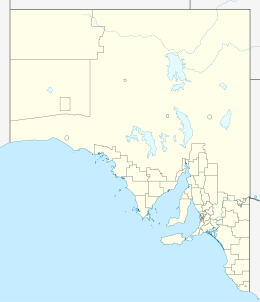Blakiston, South Australia
| Blakiston South Australia | |
|---|---|
|
St James' Church | |
 Blakiston | |
| Coordinates | 35°03′S 138°53′E / 35.050°S 138.883°ECoordinates: 35°03′S 138°53′E / 35.050°S 138.883°E |
| Population | 697 (2006 census)[1] |
| Established | 1839 |
| Postcode(s) | 5250 |
| Location |
|
| LGA(s) | District Council of Mount Barker |
| State electorate(s) | Kavel |
| Federal Division(s) | Mayo |
Blakiston is a town in the Australian state of South Australia. The town is located approximately 36 kilometres (22 mi) south-east of the state capital, Adelaide, adjacent to the Princes Highway. Its postal code is 5250 - though it has no post office. Post is delivered to the neighbouring town of Littlehampton which shares the post code. The town and surrounding countryside make up around 16 square kilometres. At the 2006 census, Blakiston and the surrounding area had a population of 697.[1]
Blakiston has been occupied since 1846. The town was founded by Francis Davison and named for his ancestral home, Blakiston Hall in County Durham.[2] Its main (only) landmarks include a roadside pub and stage house (currently a private house), a cheese factory converted to a private residence, St James Church (consecrated in 1846) and neighbouring rectory, a demolished school house and the large residence of Blakiston House as well as a smaller residence. Rumour has it that the old school house was in fact demolished by rampaging cattle some time in the mid-20th century. All of these structures date from the mid to late 19th century and are constructed from a mix of pink sandstone and red brick. The Church and Rectory are listed buildings. On the lower east wall of the Church are some small carvings of sailing ships, possibly dating back to the mid-19th century. Blakiston is surrounded by a mixture of pastureland and eucalyptus forest and includes a few other houses dating from the mid twentieth century.
Blakiston has no signs or markers indicating that it is a separate town from the close by town of Littlehampton. In fact Blakiston is in the process of being absorbed into the suburban area of Littlehampton and as a result is losing much of its individual character.
St James Church of England
St James Church of England, in the town of Blakiston, is the fifth oldest Anglican Church in South Australia. The 10 acres (4.0 ha) of the Church, Cemetery and Rectory was bought by George Morphett and Samuel Stocks from McFarlane in 1843 and was given for the building of the church in May 1846. The parsonage was completed, and occupied by the Rev. James Pollitt, in late 1846 and completion of the church building was promised for the following year.[3] Sentence of consecration was pronounced and the Church consecrated by the Lord Bishop of Adelaide on 28 April 1848. The Church is constructed of sandstone and includes the Chapel and Rector's changing room. The Church includes some pretty stained glass windows, old pews and a small organ. Adjacent to the Church is a small bell tower of later heritage. As of 2008, the Church and cemetery are still in use, while the Rectory and surrounding acreage are rented by the Church of England to private tenants.
The Rectory is a single story sandstone building dating back to the construction of the Church. It includes 6 main rooms, including: a formal dining room, Rector's study, bedroom, formal living room and two other smaller rooms of unknown use. A newer addition was added to the house in the early 20th century which today includes the kitchen/breakfast room and a bathroom. The house has an old disused cellar. The roof of the Rectory is made of corrugated iron but hides an original timber shingle roof. The shingle roof can no longer be seen but is thought to be in pristine condition. A number of past tenants of the Rectory have reported sighting a ghostly figure in the Rector's study. The alleged apparition is of an old man, sitting and quietly reading.
Behind the Rectory is the old three-sided barn, also made of sandstone, with an earth floor. One of the walls collapsed in the early 1980s and was inadequately replaced with corrugated iron cladding.
References
- 1 2 Australian Bureau of Statistics (25 October 2007). "Blakiston (State Suburb)". 2006 Census QuickStats. Retrieved 2008-09-18.
- ↑ "Blakiston". The Manning index of South Australian history. State Library of South Australia. Retrieved 2008-09-18.
- ↑ "Local Intelligence". Adelaide Observer. IV, (183). South Australia. 26 December 1846. p. 5. Retrieved 14 September 2016 – via National Library of Australia. Variant spellings of Blakiston predominated until 1850.
External links
- "St James Church of England, Princes Hwy (North Tce), Littlehampton, SA, Australia (Place ID 7517)". Australian Heritage Database. Department of the Environment.